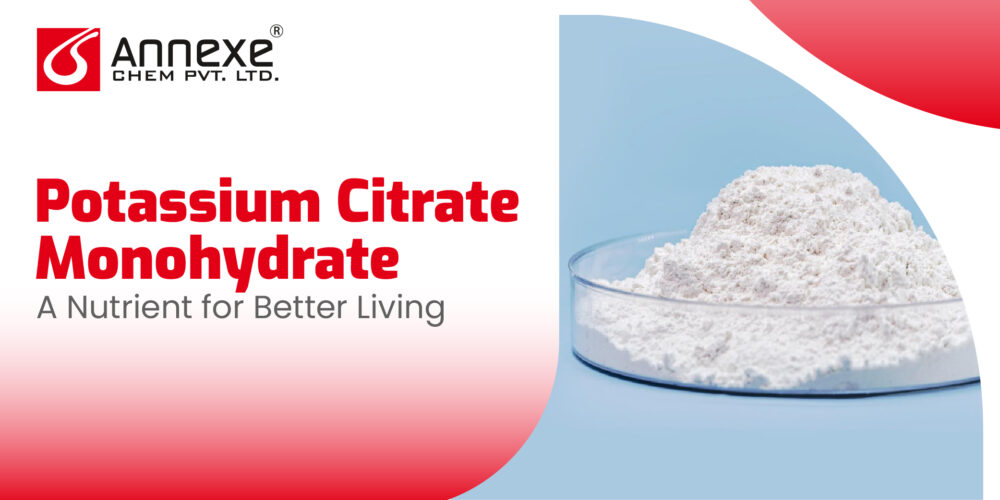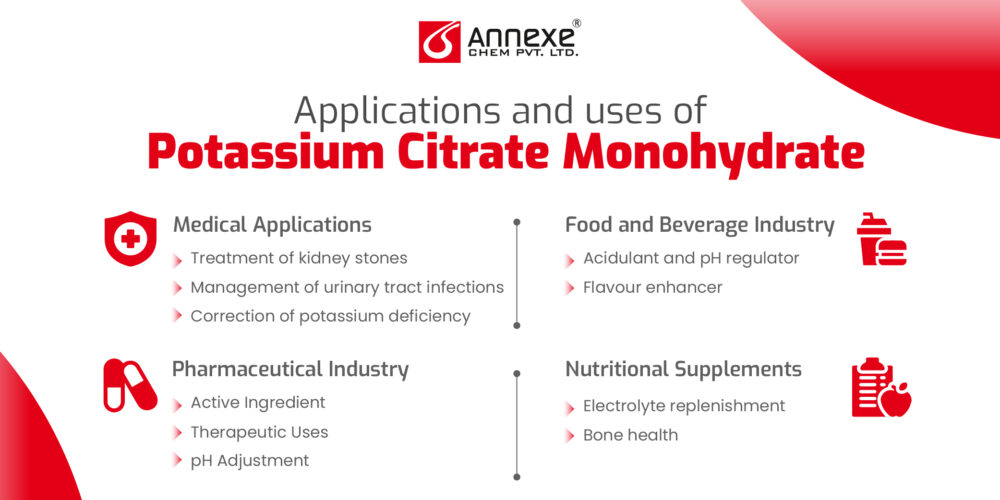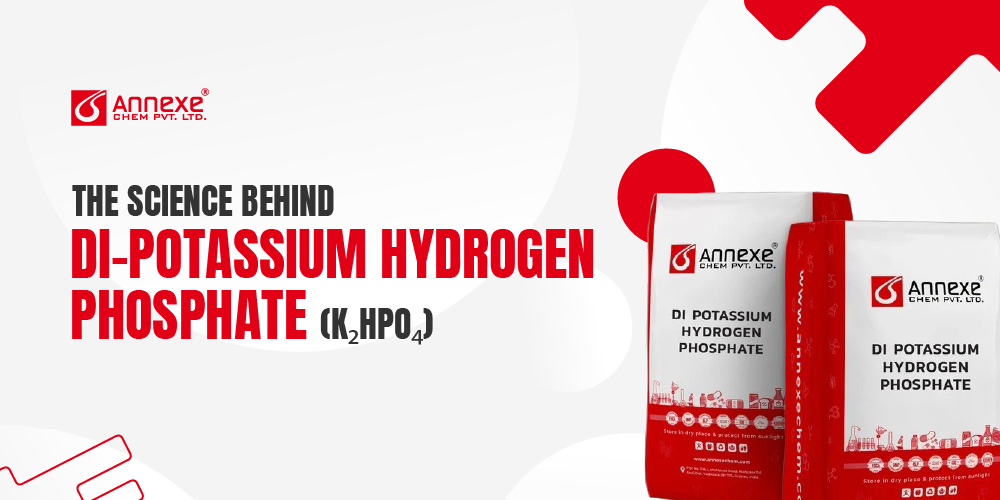Potassium Citrate Monohydrate: Essential Nutrient for Wellness
Potassium Citrate Monohydrate: A Nutrient for Better Living

- February 26, 2024
- By Akshita Patel
Potassium citrate monohydrate is a compound commonly used in supplements and medications due to its diverse health benefits. It is a supplemental source of potassium, an essential electrolyte crucial for proper muscle function, nerve transmission, and heart health. Potassium citrate monohydrate also helps maintain urinary tract health by alkalising urine, thus preventing the formation of kidney stones. Its ability to regulate pH levels in the body contributes to the overall acid-base balance. Furthermore, it may support bone health by neutralising the acid load in the body.
Formula and structure
The chemical formula for potassium citrate monohydrate is K3C6H5O7 · H2O. It consists of potassium ions (K+) and citrate ions (C6H5O7^3-) from citric acid. Additionally, each unit of potassium citrate monohydrate contains one water molecule (H2O) attached to the compound.
Physical and chemical properties of Potassium Citrate Monohydrate
Physical Properties:
- Appearance: Potassium citrate monohydrate typically appears as small white crystalline particles or granules with a powdery texture, as seen in laboratory settings and pharmaceutical preparations.
- Solubility: This compound demonstrates exceptional solubility in water, readily dissolving to form clear solutions without leaving any visible residue, which is advantageous for various industrial and medical applications.
- Density: The density of potassium citrate monohydrate, typically around 1.98 g/cm3, reflects its compactness and mass per unit volume, which are required for accurately measuring and handling the substance in scientific experiments and manufacturing processes.
- Potassium citrate monohydrate has an uncertain melting point because it decomposes when heated, transitioning directly from a solid to a gaseous state without passing through a well-defined liquid phase, posing challenges for precise thermal analysis.
Chemical Properties:
- pH: Potassium citrate monohydrate, being alkaline, elevates the pH of solutions it integrates into, exhibiting a propensity to neutralise acidity and maintain basicity in aqueous environments.
- Stability: Under typical storage conditions, potassium citrate monohydrate maintains stability; however, exposure to elevated temperatures or incompatible substances may trigger its decomposition, necessitating careful handling and storage protocols.
- Reactivity: When exposed to acids, potassium citrate monohydrate undergoes chemical reactions that produce salts while emitting carbon dioxide gas, demonstrating its versatile reactivity in many chemical contexts.
- Hygroscopicity: Potassium citrate monohydrate has a moderate degree of hygroscopicity and attracts and absorbs moisture from its surroundings, influencing its handling and storage requirements to avoid unwanted composition changes.
- Ionisation: In solution, potassium citrate monohydrate dissociates into potassium ions (K+) and citrate ions (C6H5O7^3-), facilitating its role as an electrolyte and influencing biochemical and physiological interactions within biological systems.
Different forms of Potassium Citrate Monohydrate
- Powder: Potassium citrate monohydrate is commonly available in powder form, which can easily dissolve in water or other beverages before consumption.
- Granules: Granular forms of potassium citrate monohydrate are also available, offering similar ease of use as the powder form.
- Tablets/Capsules: Potassium citrate monohydrate has been processed into tablets or capsules for convenient oral administration. These solid dosage forms provide measured doses of the compound.
- Solutions: Liquid formulations of potassium citrate monohydrate are available, providing a ready-to-use option for those who prefer liquid medications or supplements.
The availability of potassium citrate monohydrate in various forms, such as powder, granules, tablets, capsules, and solutions, allows for more significant dosing and administration flexibility, ensuring compatibility with a wide range of consumer preferences and needs for ease of use and effectiveness.

Applications and uses of Potassium Citrate Monohydrate
Potassium citrate monohydrate holds significance due to its versatile applications. It is vital in medical treatments for preventing kidney stones and managing urinary tract infections. Additionally, it addresses potassium deficiencies, which are essential for proper muscle, nerve, and heart function. In the food and beverage industry, it acts as an acidulant and pH regulator, while in pharmaceuticals, it is an active ingredient. Some of the applications are
Medical Applications:
- Treatment of kidney stones: Potassium citrate monohydrate is used to prevent the formation of kidney stones by alkalinising urine, which helps dissolve existing stones and prevents new ones from forming.
- Management of urinary tract infections: It may be prescribed to help reduce the acidity of urine, making it less favourable for bacterial growth and aiding in urinary tract infections.
- Correction of potassium deficiency: Potassium citrate monohydrate supplements are used to replenish potassium levels in individuals with low potassium levels due to conditions such as diarrhoea, vomiting, or certain medications.
Food and Beverage Industry:
- Acidulant and pH regulator: Potassium citrate monohydrate is used as a food additive to regulate acidity and pH in various food and beverage products.
- Flavour enhancer: It is a flavouring agent in specific food and beverage formulations, enhancing taste profiles.
Pharmaceutical Industry:
- Active Ingredient: Potassium citrate monohydrate is an essential active ingredient in various pharmaceutical formulations.
- Therapeutic Uses: It is used to prevent kidney stones to maintain urinary tract health, and correct potassium deficiencies.
- pH Adjustment: Potassium citrate monohydrate may be employed to adjust the pH levels in pharmaceutical preparations, ensuring optimal stability and efficacy.
Nutritional Supplements:
- Electrolyte replenishment: It is included in electrolyte supplements and sports drinks to help replenish potassium levels lost through sweating during physical activity.
- Bone health: Some nutritional supplements contain potassium citrate monohydrate to support bone health by neutralising acid load in the body.
Health benefits of Potassium Citrate Monohydrate
It offers many health advantages, including kidney stone prevention, electrolyte balance maintenance, bone health promotion, pH regulation, blood pressure control, urinary tract health support, enhanced muscle function, and cardiovascular protection, fostering overall well-being.
- Kidney Stone Prevention: Potassium citrate monohydrate alkalinises urine, effectively inhibiting the formation of specific kidney stones while facilitating the dissolution of existing ones, safeguarding renal health and reducing the risk of recurrent stone formation.
- Electrolyte Balance: Potassium citrate monohydrate replenishes essential potassium levels crucial for muscle contraction, nerve transmission, and heart function, promoting overall physiological balance and performance.
- Bone Health: By neutralising excess acid, potassium citrate monohydrate potentially mitigates calcium loss from bones, fostering bone mineral density and long-term skeletal health.
- Acid-Base Balance: Potassium citrate monohydrate regulates pH levels, promoting metabolic stability and preventing acidosis or alkalosis complications, resulting in optimal physiological function.
- Blood Pressure Regulation: Potassium citrate monohydrate may help manage hypertension risk, reduce cardiovascular strain and enhance vascular health for long-term well-being.
- Urinary Tract Health: Through urine acidity reduction, potassium citrate monohydrate diminishes the likelihood of urinary tract infections, promoting urinary system integrity and overall urinary health.
- Muscle Function: Vital for muscle contractility and relaxation, potassium citrate monohydrate supports physical performance, ensuring efficient movement and functional capacity across various activities.
- Heart Health: With its role in maintaining electrolyte equilibrium and modulating blood pressure, potassium citrate monohydrate supports cardiovascular function, mitigating risks of heart-related complications and promoting cardiac wellness.
In summary, potassium citrate monohydrate offers a range of health benefits, spanning from kidney stone prevention to cardiovascular support, making it integral to overall well-being.
Safety Guidelines for Potassium Citrate Monohydrate
Adhering to safety guidelines is crucial for potassium citrate monohydrate use due to its reactivity with acids, potential decomposition under certain conditions, and hygroscopic nature, all of which pose risks to human health and safety if mishandled.
- Dosage: Adhere strictly to recommended dosage instructions from healthcare providers or product labels, as deviations can lead to ineffective treatment or potential overdose, risking adverse health outcomes and complications requiring medical intervention.
- Hydration: Maintain adequate fluid intake alongside potassium citrate monohydrate consumption to prevent dehydration, safeguard renal function, and mitigate the risk of kidney stone formation, emphasising the importance of hydration management for overall health.
- Medical Advice: Seek comprehensive medical guidance before initiating potassium citrate monohydrate therapy, crucial for individuals with preexisting renal impairments, cardiac conditions, or those concurrently using medications affecting potassium levels, ensuring personalised risk assessment and treatment optimisation.
- Monitoring: Implement regular potassium level assessments through blood tests, particularly essential for patients with renal dysfunction or a predisposition to hyperkalemia, enabling proactive management strategies and timely intervention to mitigate adverse outcomes and maintain electrolyte balance.
- Adverse Effects: Stay vigilant for potential adverse reactions such as gastrointestinal disturbances, including nausea, vomiting, or diarrhoea, and promptly discontinue potassium citrate monohydrate if symptoms manifest, prioritising patient safety and well-being through proactive monitoring and symptom management.
- Interactions: Exercise caution regarding concurrent administration with drugs or supplements influencing potassium metabolism, underscoring the necessity of healthcare supervision to prevent drug interactions, adverse effects, and therapeutic failure, and promoting safe and effective treatment outcomes.
- Storage: Adhere to appropriate storage practices, shielding potassium citrate monohydrate products from environmental factors such as light, moisture, and heat to maintain stability and potency, ensuring product integrity and efficacy throughout their shelf life.
- Handling: Implement proper handling protocols to avert accidental ingestion, inhalation, or ocular or dermal exposure, emphasising prompt rinsing with water upon contact and seeking medical attention for persistent irritation or adverse effects, prioritising safety in product utilisation and handling procedures.
- Disposal: Dispose of unused or expired potassium citrate monohydrate by local waste disposal regulations to prevent environmental contamination and minimise ecological impact, fostering responsible medication management and environmental stewardship.
- Allergies: Exercise caution and avoid potassium citrate monohydrate use in individuals with documented hypersensitivity to the compound or related substances, emphasising alternative therapeutic options and comprehensive allergy management strategies under healthcare supervision.
Conclusion
Potassium citrate monohydrate offers versatile health benefits, from preventing kidney stones to supporting cardiovascular health. Prioritising safety with the correct dosage, medical consultation, and proper handling is essential for optimal outcomes in its varied applications.
Annexe Chem, a leading manufacturer and supplier in India, is a reliable source of high-quality potassium citrate monohydrate. With a reputation for excellence and a commitment to product quality and customer satisfaction, we provide a trusted source for potassium citrate monohydrate and other chemical needs. Contact us today to learn more about our products and how we can meet your requirements for potassium citrate monohydrate and other chemical solutions.

Akshita Patel
As an advocate for sustainability, Akshita is committed to driving positive change within the chemical industry. She actively seeks out environmentally friendly solutions and promotes the adoption of sustainable practices. Akshita believes that a balance between economic growth and ecological responsibility is crucial for the industry's long-term success. She is dedicated to finding innovative ways to minimize environmental impact while maximizing efficiency and profitability.
Related Blogs

- March 25, 2025
- By Akshita Patel
The Science Behind Di-Potassium Hydrogen Phosphate.
Ever wondered what keeps your favorite processed foods fresh, enhances crop growth, and plays a vital.

- May 12, 2025
- By Akshita Patel
Why Citric Acid Anhydrous is a.
Ever wondered what gives your favorite fizzy drink its tangy kick or keeps your skincare products.



